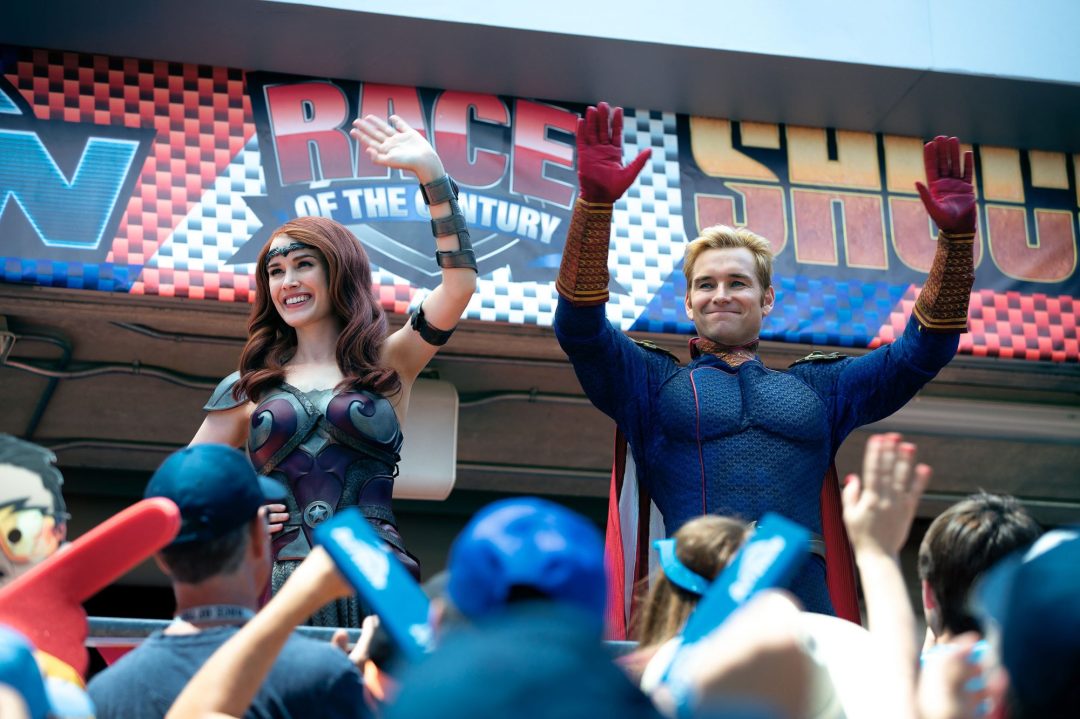There’s a delicious scene in the new season of Amazon’s superheroes-gone-bad series The Boys. The chief superhero Homelander (Antony Starr) is introduced by a minion to a potential new member of his elite superhero group, the Seven.
Homelander watches this bright new talent performing wonders in a gym-style training zone: the young man is agile, eager, skilled with weaponry; but perhaps his most valuable features, the minion suggests, are that he is disabled and belongs to an ethnic minority. This could play really well with the youth demographic, who are into that kind of woke stuff, the aide suggests.
The potential recruit approaches Homelander, sweet, modest and starstruck. Even though the kid is blind, his batlike hearing more than makes up for his loss of sight, and he’d clearly make a great new member of the team. But Homelander has one reservation. And — spoiler alert — he boxes the kid’s ears so hard that the drums burst and he writhes helplessly in a pool of blood.
The Boys grabs every politically correct shibboleth by the balls and squeezes till it explodes in a bloody pulp
It was at this point I realised, to my delight, that the rumours I thought I’d seen on the internet — that The Boys had lost its mojo — were most definitely untrue. This season, as before, The Boys is on a mission to shock, to appall, to grab every politically correct shibboleth by the balls and squeeze till it explodes in a nauseating bloody pulp. I love this, obviously.
But it’s not just because I enjoy sick, puerile, flippant, inappropriate, blackly humorous things. It’s also because — even more so than when the first series was released in 2019 — we sorely need transgressive, near-the-knuckle dramas like this to counter the otherwise near relentless slew of career-safe, impeccably diversely cast, consciousness-raising tosh inflicted on us especially by the BBC but increasingly by Netflix and Amazon Prime and all the other digital channels that really should know better.
I realise that I make this point a lot: but someone needs to hammer it home lest this state of affairs become permanent. Scenes like that one from The Boys — and the fact that it could even get made in this cautious, artistically spavined era — give me hope that we are reaching a turning point: where the producers, directors, channels and, most importantly, the money men realise that the most vital, interesting and watchable TV these days is made by creatives who just don’t give a damn about the prevailing conventions.
Based on the comic books of Garth Ennis and Darick Robertson, The Boys is set in a world very much like ours, except that it is one where superheroes are real, are treated like Hollywood movie stars or rock gods — and abuse the public’s adoration of them at least as badly. Being more or less indestructible they can do what they like: untrammelled power, we are reminded, tends almost inevitably to rampant abuses.
Not that The Boys wastes too much time in moral messaging — or indeed on comprehensible plot lines. Mainly, you feel, it exists to be naughty and make you either giggle or heave. Or both in the case of Gecko, an amiable sort whose special power is that he feels no pain and can autoregenerate severed limbs. This earns him a tidy living on the S&M circuit, perverts paying him for the pleasure of chopping off his legs or arms. ‘For another grand I’ll let you chop off my dick,’ he tells one client. ‘Where’s the nearest cashpoint?’ the client replies.
Though I doubt Ennis or series developer Eric Kripke ever intended to make a powerful statement about the madness of our times, they seem to have accidentally done so in depicting a world where if there’s one thing you can be sure of with the ruling hegemony it’s that it’s corrupt, self-serving and, behind its caring smile, utterly contemptuous of little people like you. ‘Basically you’re on your own and good luck to you!’ it says. And it’s right.
Grayson Perry’s Big American Road Trip is a series I wouldn’t have bothered with had it been presented by almost anyone other than Grayson Perry. I met him at last year’s Spectator party and one of his special qualities is his considered frankness. He’s not out to shock (oddly enough, for a man who so often wears dresses) but nor is he in the business of making you comfortable with insincerity. He appraises you coolly, like a curious object or a model in a studio, and pronounces without fear or favour.
This disarming bluntness means that, unlike with most celebrities, his pronouncements are utterly free of cant. When he goes to Atlanta, for example, to meet the new black moneyed class, he doesn’t fawn over them, or try to demean his own race to curry favour with them. He just wants to understand better — and as a result we do too. Oh, and his self-designed, multicoloured biker’s leather outfit is to die for.








Comments